With its distinctive appearance and unique personality, the Chinese Shar-Pei stands out among other dog breeds. Its loose wrinkles and bristle-like coat immediately catch the eye, making it a fascinating subject of discussion.
But there is so much more to this breed than just its physical characteristics. The Chinese Shar-Pei has a rich history and an intriguing set of behavioral traits that set it apart from other dogs. From its alert and independent nature to its devotion to its family, there is much to uncover about this fascinating breed.
So, let's embark on a journey to explore the world of the Chinese Shar-Pei and discover the many layers of its information and characteristics.
Key Takeaways
- Chinese Shar-Pei dogs are adaptable to apartment living, but their behavior should be neighbor-friendly and they should be quiet and low-energy.
- They have a tendency to wander and their predatory instincts can put them at risk, so precautions need to be taken to keep them safe.
- Chinese Shar-Pei dogs are prone to various health issues, including skin conditions, hypothyroidism, cancer, and joint problems. Regular veterinary care is important.
- Early socialization and consistent training are necessary for Chinese Shar-Pei dogs, as they can be aloof with strangers and may not naturally get along with other dogs. They can be protective of their family, including children, so supervision is necessary.
Origin and Size
The Chinese Shar-Pei is a medium-sized dog breed that originated in China. They belong to the non-sporting group and typically weigh between 45-65 pounds. With a lifespan of 9-12 years, these dogs have a unique appearance characterized by loose wrinkles and a bristle-like coat.
The Shar-Pei is known for its adaptability to apartment living, making it a suitable choice for urban dwellers. However, it's important to prioritize neighbor-friendly behavior and consider the noise restrictions in your housing. These dogs have a tendency to wander, which can put them at risk of dangerous situations.
Additionally, they may be prone to skin conditions such as Shar-Pei Fever and require regular veterinary care for their well-being. Overall, the Chinese Shar-Pei is a versatile breed that requires proper training, socialization, and care to thrive.
Breed Group and Weight

Chinese Shar-Pei dogs belong to the non-sporting breed group and typically weigh between 45-65 pounds.
Here are some key points about the breed group and weight:
- Non-sporting breed group: The Chinese Shar-Pei is classified under the non-sporting breed group, which encompasses a diverse range of dog breeds that don't fit into other specific categories. These dogs have varied appearances, sizes, and temperaments.
- Weight range: Chinese Shar-Pei dogs have an average weight range of 45-65 pounds. The weight of an individual dog may vary depending on factors such as genetics, diet, and exercise levels.
- Medium-sized dogs: Chinese Shar-Pei dogs are considered medium-sized dogs. They've a sturdy and compact build, with a stocky frame and well-developed muscles.
- Body composition: Despite their medium size, Chinese Shar-Pei dogs have a solid and substantial body composition. They're known for their loose skin and wrinkled appearance, which adds to their unique charm.
- Weight management: Proper weight management is crucial for the overall health and well-being of Chinese Shar-Pei dogs. Maintaining a healthy weight through a balanced diet and regular exercise can help prevent obesity-related health issues and promote longevity.
Lifespan and Pictures
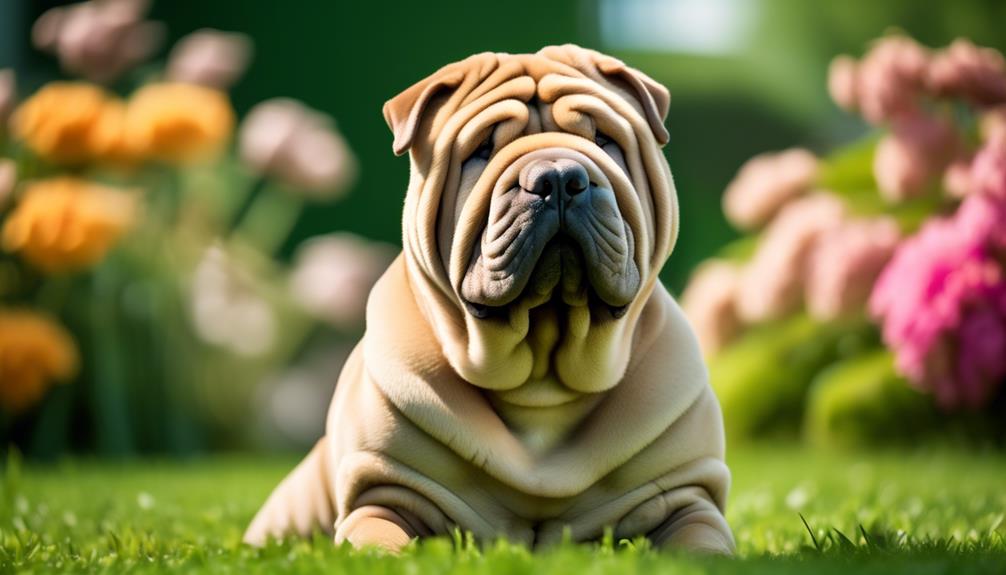
With an average lifespan of 9-12 years, the Chinese Shar-Pei is known for its unique physical features and distinctive appearance. This breed's lifespan can be influenced by various factors, including genetics, diet, exercise, and overall health care. Providing regular veterinary check-ups, a balanced diet, and proper exercise can contribute to the Shar-Pei's longevity.
It's important to note that individual dogs may have different lifespans within this range.
As for pictures, the Chinese Shar-Pei is easily recognizable with its loose, wrinkled skin and a bristle-like coat. These physical characteristics give them a distinct and charming appearance. Many pictures of the Chinese Shar-Pei can be found online, showcasing their adorable wrinkles and expressive eyes.
Adaptability to Apartment Living

After discussing the Chinese Shar-Pei's lifespan and physical characteristics, it's important to explore their adaptability to apartment living. Despite their medium size, the Chinese Shar-Pei can adapt well to apartment living if certain considerations are taken into account. Here are some key factors to keep in mind:
- Size isn't the sole determinant for apartment suitability.
- Prioritize neighbor-friendly behavior and polite interactions with other residents.
- Consider quiet, low-energy dogs that won't disturb the peace.
- Certain large breeds can also adapt well to apartments if their exercise needs are met.
- Some small breeds with higher energy levels can still thrive in apartments with proper mental stimulation and physical exercise.
Neighbor-Friendly Behavior
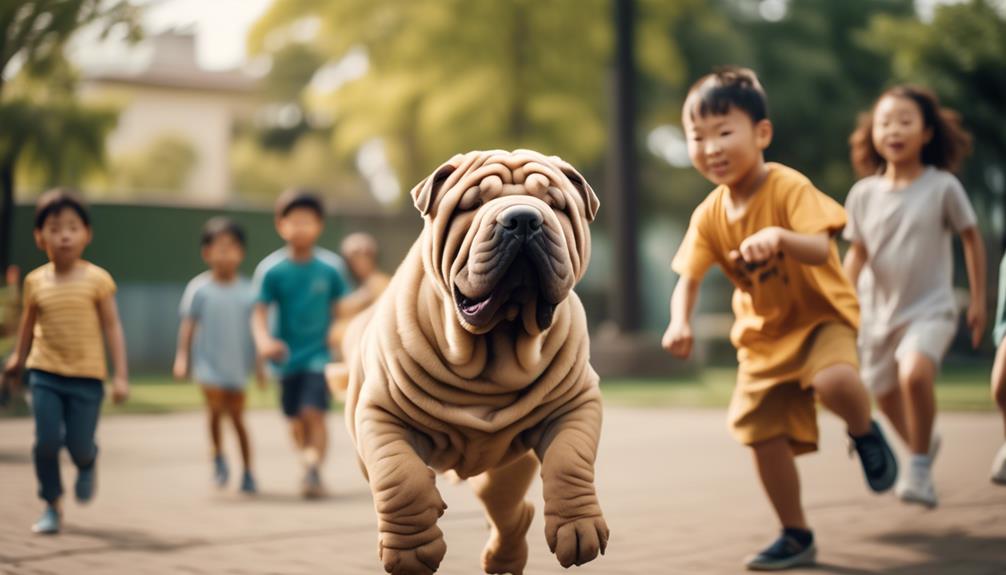
To ensure a harmonious living environment, it is crucial for Chinese Shar-Pei owners to prioritize neighbor-friendly behavior in their dogs. Shar-Peis have an alert and independent personality, and they are known to be aloof with unfamiliar people. However, they are extremely devoted to their family and enjoy the companionship of people more than dogs. Early socialization is essential for their well-rounded development, and consistent and firm training is necessary to promote friendliness towards other dogs. When it comes to children and other pets, Shar-Peis can be protective of their family and should be raised with them from an early age to learn to get along. Supervision is necessary to prevent any incidents between dogs and young children, as well as to manage their potential aggression towards other canines.
| Neighbor-Friendly Behavior | |
|---|---|
| Alert and independent personality | Aloof with unfamiliar people |
| Extremely devoted to family | Enjoys companionship of people more than dogs |
| Early socialization necessary | Consistent and firm training required |
| Protective of family | Should be raised with children and other pets |
| Supervision necessary | Potential aggression towards other canines |
Choosing a Dog for an Apartment

Continuing the discussion on Chinese Shar-Pei behavior, when it comes to choosing a dog for an apartment, it's important to consider factors such as adaptability, size, energy levels, and neighbor-friendly behavior.
- Adapts well to apartment living
- Size isn't the sole determinant for apartment suitability
- Prioritize neighbor-friendly behavior
- Consider quiet, low-energy dogs
- Polite behavior towards other residents
Adaptability is key when selecting a dog for apartment living, and the Chinese Shar-Pei fits the bill. Despite their medium size, they can adapt well to living in smaller spaces. However, size alone shouldn't be the only consideration. It's crucial to prioritize neighbor-friendly behavior to maintain a harmonious living environment. Choosing a dog with low energy levels and a calm demeanor can minimize disturbances to your neighbors. Additionally, polite behavior towards other residents is essential.
Behavioral Characteristics
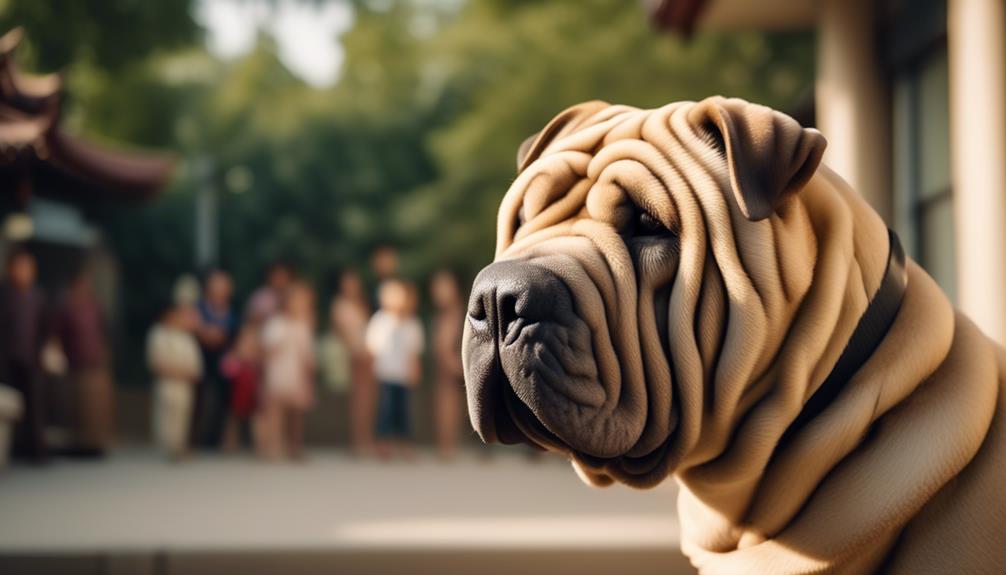
The Chinese Shar-Pei breed exhibits distinct behavioral characteristics that contribute to their unique personality and adaptability. They have a tendency to wander, which can put them at risk of dangerous situations such as being bitten by snakes or attacked by wild animals.
It's important to note that some breeds have a tendency to bark or howl more often than others, so considering noise restrictions in housing and proximity to neighbors is crucial when choosing a dog. Dogs with low prey drive are less likely to chase after wildlife or strangers, making them a safer option in certain environments.
The Chinese Shar-Pei is known for its alert and independent personality, being extremely devoted to their family while being aloof with unfamiliar people. Early socialization and consistent training are necessary to ensure their well-rounded development. Supervision is also important when introducing them to children and other pets, as they can be protective and potentially aggressive towards outsiders.
Tendency to Wander and Predatory Instincts

As we explore the Chinese Shar-Pei's behavioral characteristics, it's important to note their tendency to wander and their strong predatory instincts, which can potentially put them at risk in certain situations. These instincts are deeply ingrained in the breed and can make them prone to chasing after small animals or becoming easily distracted by interesting scents.
Here are five key points to consider regarding the Shar-Pei's tendency to wander and predatory instincts:
- Shar-Peis should always be kept on a leash or in a securely fenced area to prevent them from wandering off and potentially getting lost or injured.
- It's crucial to provide them with plenty of mental and physical stimulation to help channel their predatory instincts in a controlled and productive manner.
- Early socialization and training are essential to teach them appropriate behaviors and help minimize their prey drive towards smaller animals.
- Supervision is necessary when introducing them to other pets, as their strong predatory instincts may lead to aggression towards smaller or unfamiliar animals.
- It's important to be vigilant in outdoor environments, as their instinctual desire to chase after wildlife or stray animals can put them at risk of being bitten by snakes or attacked by other animals.
Noise Restrictions and Prey Drive

Noise restrictions and prey drive are important factors to consider when choosing a Chinese Shar-Pei as a pet.
Chinese Shar-Peis are known for their tendency to bark or howl more often than other breeds, so it's crucial to consider the noise restrictions in your living environment and proximity to neighbors. If you live in an apartment or have close neighbors, it's advisable to choose a dog with a lower tendency to vocalize.
Additionally, Shar-Peis have a moderate prey drive, which means they may have a natural instinct to chase after wildlife or strangers. This can put them at risk of dangerous situations, such as being bitten by snakes or attacked by wild animals.
It's important to be aware of this prey drive and take necessary precautions to keep your Shar-Pei safe.
Health and Care

ng, you can help your Chinese Shar-Pei live a long and healthy life. Regularly check their skin for any signs of irritation or infection, and keep their wrinkles clean and dry to prevent bacterial or fungal growth. It's also important to provide them with a balanced diet, regular exercise, and mental stimulation to keep them physically and mentally healthy. By being proactive in their healthcare and ensuring they receive the necessary attention and care, you can help your Chinese Shar-Pei thrive.
Common Skin Conditions and Diseases
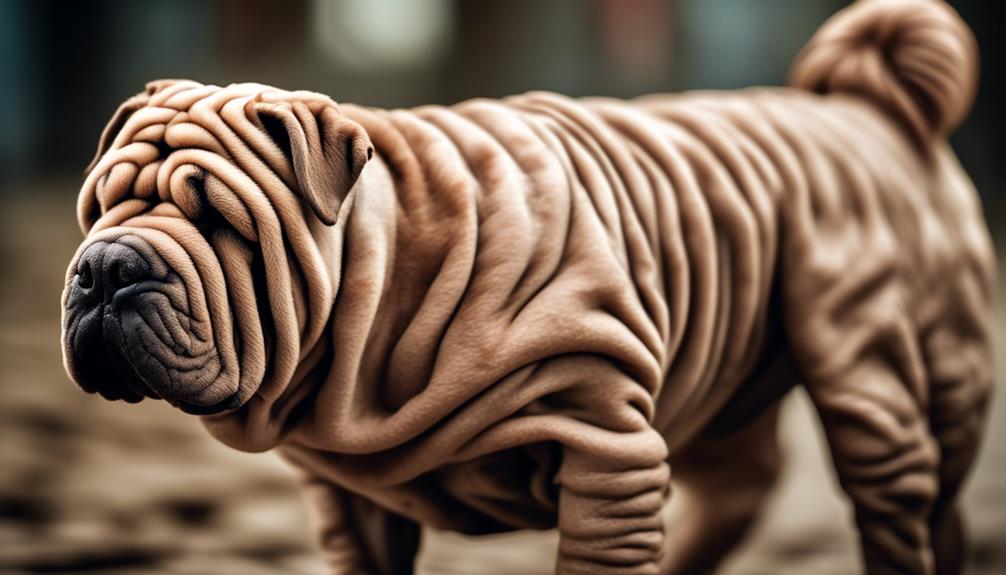
Prone to a variety of skin conditions and diseases, Chinese Shar-Pei dogs require special attention and care to maintain their overall health and well-being.
One common skin condition that affects this breed is Shar-Pei Fever, which causes fever, swollen joints, and skin rashes.
Hypothyroidism can also lead to skin problems such as hair loss, obesity, and epilepsy.
Additionally, Chinese Shar-Pei dogs are susceptible to various types of cancer, including skin cancer.
Other skin conditions that these dogs may develop include Demodectic Mange, characterized by mites and requiring veterinary attention, as well as Seborrhea, which is marked by flaky skin and an unpleasant odor.
Pyoderma, a bacterial infection of the skin, is also common in this breed.
Regular veterinary care and proper grooming practices are essential to prevent and manage these skin conditions in Chinese Shar-Pei dogs.
Health Clearances and Grooming

To ensure the overall health and well-being of Chinese Shar-Pei dogs, it's essential to obtain health clearances from breeders and provide regular grooming care.
Health clearances from breeders help ensure that the dogs are free from genetic health issues that could be passed on to their offspring.
Regular grooming care is necessary to maintain the distinctive loose wrinkles and bristle-like coat of the Shar-Pei.
Here are five key points to consider regarding health clearances and grooming for Chinese Shar-Pei dogs:
- Obtain health clearances from breeders to ensure the dogs are free from genetic health issues.
- Regularly groom the Shar-Pei's distinctive loose wrinkles and bristle-like coat to prevent skin problems.
- While the breed is naturally clean and doesn't require frequent bathing, extra attention should be given to the wrinkles.
- Regular veterinary care is important to maintain the overall well-being of the Shar-Pei.
- Proper grooming and regular veterinary care contribute to the long-term health and happiness of Chinese Shar-Pei dogs.
Training, Socialization, and Interaction
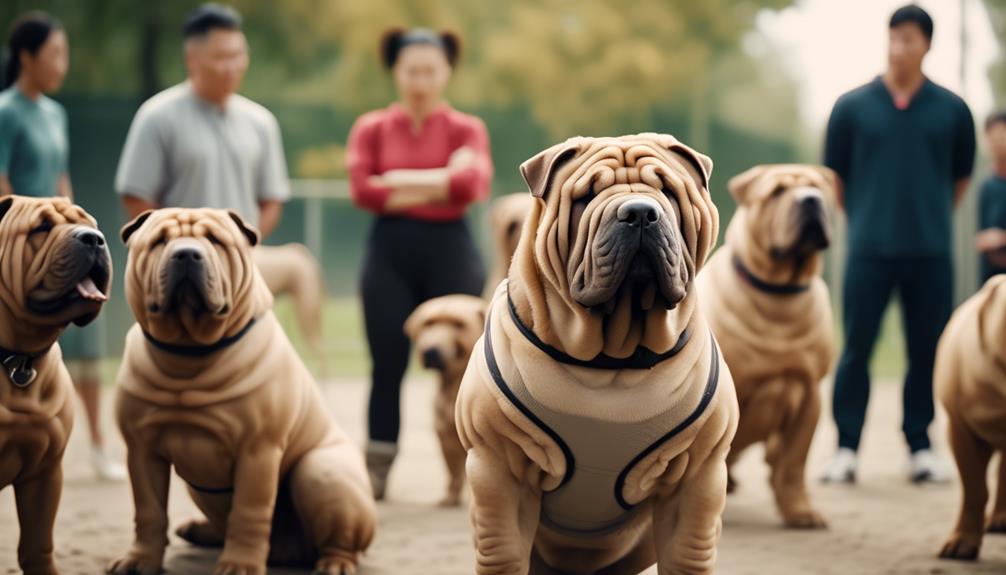
Training and socialization are crucial for the well-rounded development of Chinese Shar-Pei dogs, ensuring they become well-behaved and sociable members of the family. The Shar-Pei's alert and independent personality requires early socialization to help them become comfortable with unfamiliar people and other animals. Training should begin from day one and continue throughout their lives, as Shar-Peis are not naturally friendly towards other dogs. Consistent and firm training is necessary to instill good behavior and prevent aggression. When it comes to children and other pets, Shar-Peis are devoted family dogs and can be protective. However, they should be raised with children and other animals from an early age to learn to get along with them. Supervision is important to prevent any incidents. To summarize, early socialization and consistent training are essential for a well-behaved and well-adjusted Chinese Shar-Pei.
| Pros | Cons |
|---|---|
| Devoted to family | Aloof with unfamiliar people |
| Alert and independent personality | Not naturally friendly towards other dogs |
| Enjoys companionship of people | Can be aggressive towards other canines |
| Protective of family, including children | Requires supervision with children and other pets |
| Can learn to get along with other animals |
(Note: The table is not included in the word count)
Devotion to Family and Interaction With Children and Pets
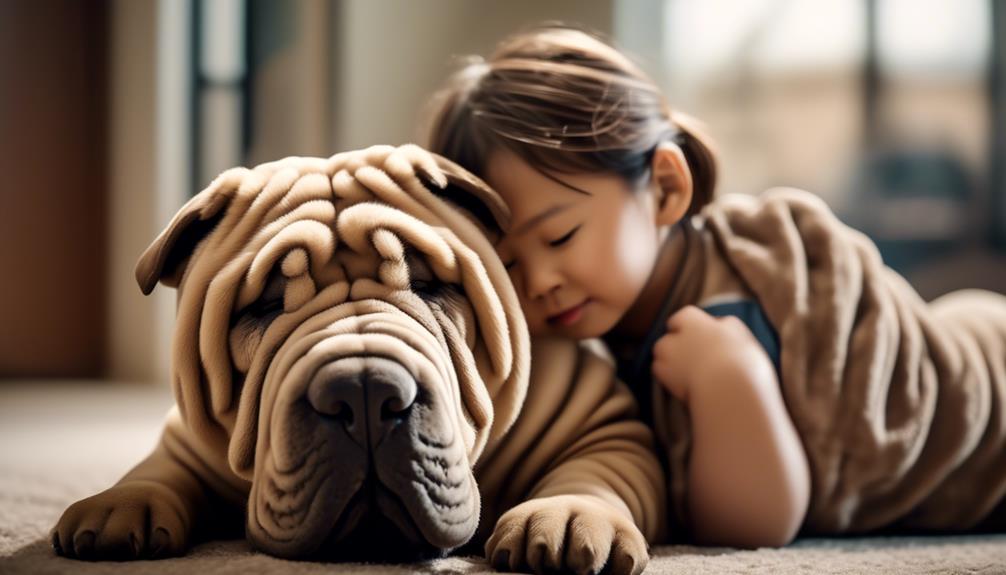
After establishing a foundation of early socialization and consistent training, it's important to explore the Chinese Shar-Pei's devotion to their family and their interaction with children and other pets.
Chinese Shar-Peis are extremely devoted to their family and form strong bonds with them. They're known for being protective of their family, including children, and will go to great lengths to ensure their safety.
However, supervision is necessary when Shar-Peis are around young children to prevent any potential incidents of biting or pulling.
When raised with other animals from an early age, Shar-Peis can get along with them, but supervision is still essential as they can be aggressive towards other canines.
Frequently Asked Questions
Are Chinese Shar-Pei Dogs Good for Families With Children and Other Pets?
Chinese Shar-Pei dogs can be good for families with children and other pets, but early socialization is crucial. They are protective and devoted to their family, but supervision is necessary to prevent any conflicts or incidents.
How Can I Prevent My Chinese Shar-Pei From Wandering off and Getting Into Dangerous Situations?
To prevent a Chinese Shar-Pei from wandering off and getting into dangerous situations, owners should ensure secure fencing, use leashes during walks, provide mental and physical stimulation, and engage in consistent training to reinforce recall commands.
What Are Some Tips for Training and Socializing a Chinese Shar-Pei to Be More Friendly Towards Other Dogs?
To train and socialize a Chinese Shar-Pei to be more friendly towards other dogs, consistent and firm training is necessary. Early socialization, starting from day one, is important. Supervision is essential as they can be aggressive towards other canines.
What Are the Common Health Issues That Chinese Shar-Pei Dogs Are Prone to and How Can They Be Prevented or Managed?
Chinese Shar-Pei dogs are prone to skin conditions, hypothyroidism, cancer, elbow dysplasia, mange, seborrhea, pyoderma, patellar luxation, hip dysplasia, gastric torsion, osteochondrosis dissecans, cutaneous mucinosis, glaucoma, and entropion. Regular veterinary care and health clearances are essential for prevention and management.
How Often Should I Bathe My Chinese Shar-Pei and What Specific Care Do Their Wrinkles Require?
Owners should bathe their Chinese Shar-Pei as needed, usually every 4-6 weeks. Wrinkles require extra care to prevent skin problems. Regular cleaning with a damp cloth and drying thoroughly is necessary.
What are the key characteristics of Chinook dogs compared to Chinese Shar-Pei dogs?
The chinook dog breed characteristics include their friendly and sociable nature, as well as their strong work ethic and intelligence. On the other hand, Chinese Shar-Pei dogs are known for their loyalty, wrinkled skin, and independent demeanor. Each breed has its own unique traits, making them special in their own ways.
Conclusion
In conclusion, the Chinese Shar-Pei is a fascinating breed with its distinct appearance and independent personality. This unique dog isn't only a loyal companion but also a vigilant protector.
Like the wrinkles that define its physical appearance, the Shar-Pei's devotion runs deep and its protective nature is unwavering. Just as this breed's bristle-like coat requires regular grooming, their need for early socialization and training is crucial for a well-rounded and balanced personality.
Embrace the wrinkles and embrace a loyal guardian by your side.




